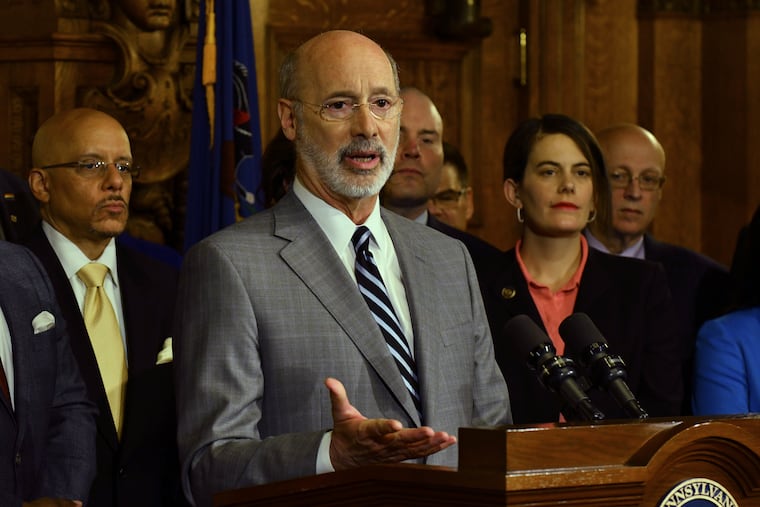Wolf pushing charter-school bill that would change funding, accountability rules
The governor, who will give his annual budget address Tuesday, said the legislation would “hold charter schools accountable and protect taxpayers."

Gov. Tom Wolf is pushing significant changes to Pennsylvania’s charter school law that his office says could save school districts statewide $280 million a year and would leave the existing charters with less funding.
The changes are outlined in a bill, sponsored by several Democratic House and Senate lawmakers and released Monday by the governor’s office, that would change the way district payments to charters are calculated. It follows Wolf’s call last year to overhaul Pennsylvania’s rules for charter school funding and accountability, as districts statewide have complained about how their budgets are affected by schools that they say they have insufficient ability to regulate.
“Every student deserves a great education, whether in a traditional public school or a charter school, but the state’s flawed and outdated charter school law is failing children, parents, and taxpayers," Wolf said in a statement Monday. “Pennsylvania has a history of school choice, which I support, but there is widespread agreement that we must change the law to prioritize quality and align funding to actual costs.”
» READ MORE: Pa. superintendents join to demand charter school reform ahead of Wolf’s budget proposal
Republicans who control the Legislature did not immediately comment on the bill, which had not yet been formally filed.
Ana Meyers, executive director of the Pennsylvania Coalition of Public Charter Schools, called it a “slash-and-burn proposal" that would mean “punitive and discriminatory” funding cuts for charter-school students.
Wolf is likely to address the issue Tuesday when he delivers his annual budget address to the legislature. Entering his sixth year in office, the Democratic governor is not expected to call for raising the income or sales taxes — proposals early in his first term that led to long impasses with the Legislature.
He is expected to advocate for increases in early education and special education funding, in addition to funding for K-12 instruction in schools. Wolf is also anticipated to advocate for a hike in the state’s minimum wage — which currently matches the federal minimum of $7.25 — as well as push for an infrastructure improvement plan to be funded through a new tax on natural gas drilling. The latter pitch, announced by Wolf last year, gained no traction with the Legislature.
Mike Straub, a spokesperson for House Republicans, said it was “too early to tell" how much support the charter law changes may have going forward because the sponsoring lawmakers — Sens. Lindsey Williams and James Brewster of Allegheny County, and Rep. Joe Ciresi of Montgomery County — were still collecting cosponsors.
Promoted by supporters as alternatives to failing public school systems, charter schools — which are independently run but funded by school districts — have attracted a growing number of students across Pennsylvania since their introduction in the late 1990s. They have an especially sizable presence in Philadelphia, where about 70,000, or one-third of public school students, are enrolled in charters. In total, charters enroll more than 143,000 Pennsylvania students.
But the school choice movement has been confronting increased controversy nationally and in Pennsylvania, where the budget challenges facing many school districts have worsened — in part because charter school costs have been rising.
» READ MORE: Gov. Wolf proposed more money for public schools, but districts say math just doesn’t add up
More than 70% of school districts surveyed this year by the Pennsylvania School Boards Association identified charter school tuition as one of their biggest budget pressures, surpassing pension contributions as the most commonly identified factor.
Districts pay charter schools based on enrollment and what districts spend on their students — a rate that varies widely across the state. The legislation backed by Wolf would set a statewide rate for what school districts pay cyber charter schools, which are authorized by the state Education Department and enroll students from across Pennsylvania.
Cyber charter costs have been a growing concern for traditional public school advocates, as well as lawmakers — including some Republicans. The House Education Committee last month held a hearing on a bill sponsored by Rep. Curt Sonney (R., Erie), that would dissolve cyber charters but require that every school district offer three full-time cyber school options.
The bill backed by Wolf would prohibit enrollment increases at cyber charters with poor academic performance, an issue that has plagued the state’s cyber charter sector.
It would also change how districts fund charters for special education students, setting different rates based on the severity of the student’s needs.
Among other provisions, the legislation would create a standard statewide framework for new charter applications. Brick-and-mortar charter schools are evaluated and approved by individual school districts.
It would also tighten regulations for charter management companies, making the private companies that contract with charters subject to the state Right-to-Know law. It would bar charter schools from advertising themselves to parents as “free,” requiring they indicate costs are paid by taxpayers.
Angela Couloumbis of Spotlight PA contributed to this article.